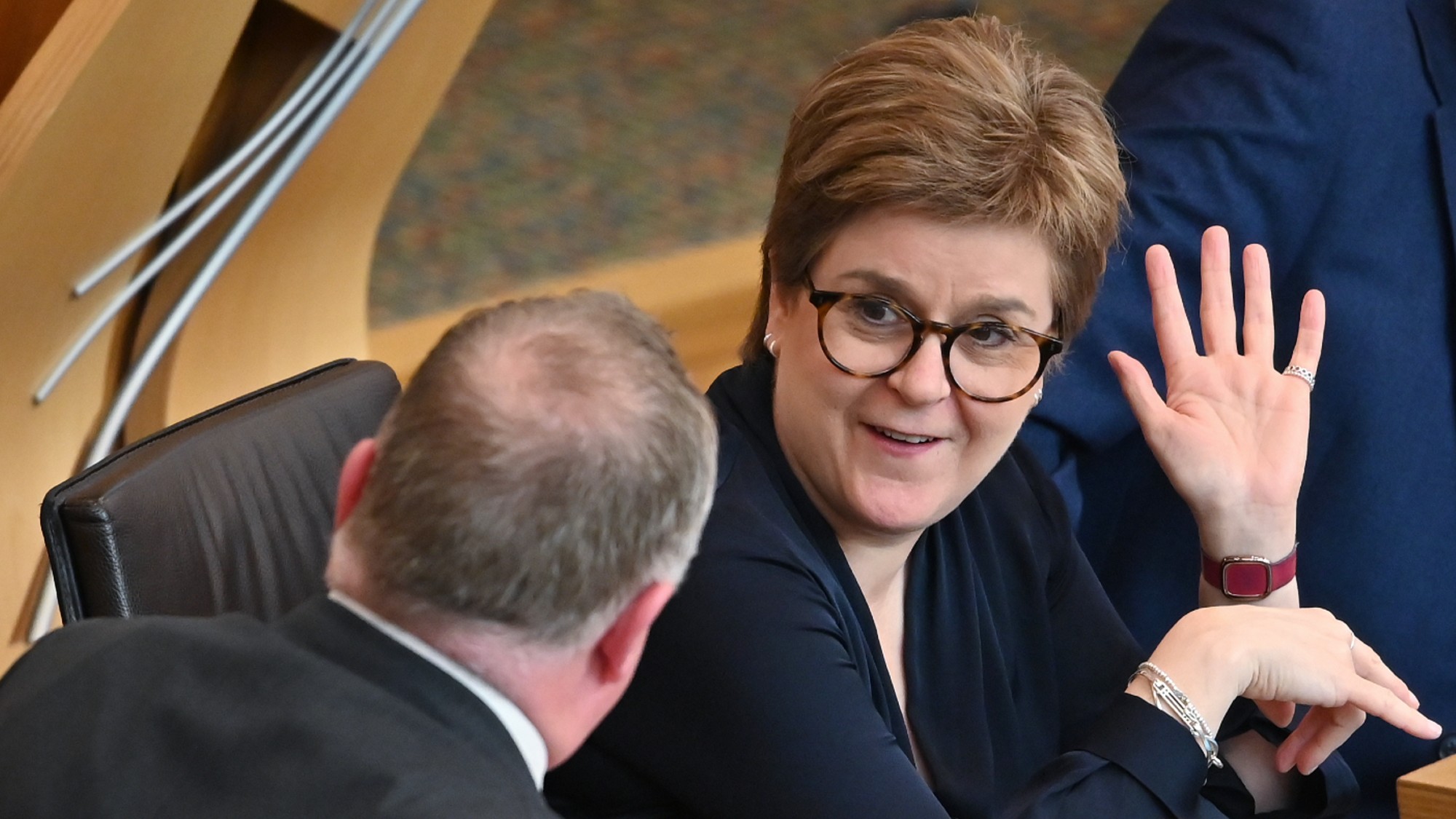Nicola’s nightmare: what if the Scots come to like Ed?
Popular Labour policies could end up binding an even greater majority of Scots to the United Kingdom

A free daily email with the biggest news stories of the day – and the best features from TheWeek.com
You are now subscribed
Your newsletter sign-up was successful
In 2010 we had ‘Cleggmania’; in 2015 we have the ‘Sturgeon surge’. Just as success in the TV debates at the last general election made Nick Clegg a national figure, so it has helped make Nicola Sturgeon a significant player on the British political scene.
But just how much power can she really hope to wield at Westminster?
A lot is made of Sturgeon ending up with 50 or so MPs at Westminster and holding “the balance of power” in the event of a hung parliament. But this is misleading.
The Week
Escape your echo chamber. Get the facts behind the news, plus analysis from multiple perspectives.

Sign up for The Week's Free Newsletters
From our morning news briefing to a weekly Good News Newsletter, get the best of The Week delivered directly to your inbox.
From our morning news briefing to a weekly Good News Newsletter, get the best of The Week delivered directly to your inbox.
The 57 Lib Dem MPs elected in 2010 really did hold the balance of power. They were able to use the possibility of doing a deal with Gordon Brown as their bargaining tool to create a coalition pact with David Cameron.
They then wielded that power within coalition most significantly when they scuttled Cameron’s attempt to change parliamentary boundaries. To do it, of course, they voted with Labour.
That’s what makes talk of Sturgeon holding the balance of power on 8 May so misleading.
Only if she were willing to talk to and vote with the Tories would she be able to “hold to ransom” Ed Miliband and Labour. But Sturgeon has had to rule that out: to do otherwise would be political suicide.
A free daily email with the biggest news stories of the day – and the best features from TheWeek.com
In exchanges with Miliband during the most recent TV debate, Sturgeon protested that she was only nine in 1979, the year the SNP famously voted with the Tories to bring down the Callaghan government, thus ushering in the Thatcher era.
As the former Scotsman editor Magnus Linklater explained this week in The Times, there are those north of the border who will never forgive the SNP for what they did in 1979 and, because of that, Sturgeon knows she cannot afford to bring down a Miliband government. “To repeat the mistake would be political death,” says Linklater.
So how will Ed Miliband deal with Sturgeon and her Westminster lieutenant, Alex Salmond, if Labour emerges the largest party in a fortnight's time?
Simple, says George Eaton of the New Statesman. Miliband will call the SNP’s bluff by challenging them to vote in favour of his first Queen's Speech. This would be filled with the kind of left-wing populist measures that Sturgeon could not oppose: an energy price freeze, a cap on rent increases, tougher banking regulation, a crackdown on zero-hours contracts, a house-building programme and further Scottish devolution.
There would, says Eaton, be no need for Labour to do a deal with the SNP – one that risks condemning “Scottish Labour to permanent irrelevance while also alienating English voters”.
Yes, Miliband will face some formidable challenges from the SNP, on the economy and defence in particular. But the idea that he would be at the beck and call of Sturgeon and Salmond is little short of ludicrous.
Indeed, by being so upfront about her support of a Labour government, it can be argued that Sturgeon has given Miliband the chance to destroy her dream of Scottish independence.
Scottish independence was voted down last September by 55 to 45 per cent. If Miliband become prime minister – with policies far more in tune with the hopes and aspirations of Scottish people than were Tony Blair’s - he has the chance to persuade an even greater majority to believe in the United Kingdom.
And where will that leave Nicola?
-
 How the FCC’s ‘equal time’ rule works
How the FCC’s ‘equal time’ rule worksIn the Spotlight The law is at the heart of the Colbert-CBS conflict
-
 What is the endgame in the DHS shutdown?
What is the endgame in the DHS shutdown?Today’s Big Question Democrats want to rein in ICE’s immigration crackdown
-
 ‘Poor time management isn’t just an inconvenience’
‘Poor time management isn’t just an inconvenience’Instant Opinion Opinion, comment and editorials of the day
-
 How corrupt is the UK?
How corrupt is the UK?The Explainer Decline in standards ‘risks becoming a defining feature of our political culture’ as Britain falls to lowest ever score on global index
-
 How long can Keir Starmer last as Labour leader?
How long can Keir Starmer last as Labour leader?Today's Big Question Pathway to a coup ‘still unclear’ even as potential challengers begin manoeuvring into position
-
 The high street: Britain’s next political battleground?
The high street: Britain’s next political battleground?In the Spotlight Mass closure of shops and influx of organised crime are fuelling voter anger, and offer an opening for Reform UK
-
 Is a Reform-Tory pact becoming more likely?
Is a Reform-Tory pact becoming more likely?Today’s Big Question Nigel Farage’s party is ahead in the polls but still falls well short of a Commons majority, while Conservatives are still losing MPs to Reform
-
 Taking the low road: why the SNP is still standing strong
Taking the low road: why the SNP is still standing strongTalking Point Party is on track for a fifth consecutive victory in May’s Holyrood election, despite controversies and plummeting support
-
 Nicola Sturgeon's memoir: making the personal political
Nicola Sturgeon's memoir: making the personal politicalTalking Point Former Scottish first minister attempts to set record straight in 'Frankly' but does she leave more questions than answers?
-
 What difference will the 'historic' UK-Germany treaty make?
What difference will the 'historic' UK-Germany treaty make?Today's Big Question Europe's two biggest economies sign first treaty since WWII, underscoring 'triangle alliance' with France amid growing Russian threat and US distance
-
 Is the G7 still relevant?
Is the G7 still relevant?Talking Point Donald Trump's early departure cast a shadow over this week's meeting of the world's major democracies